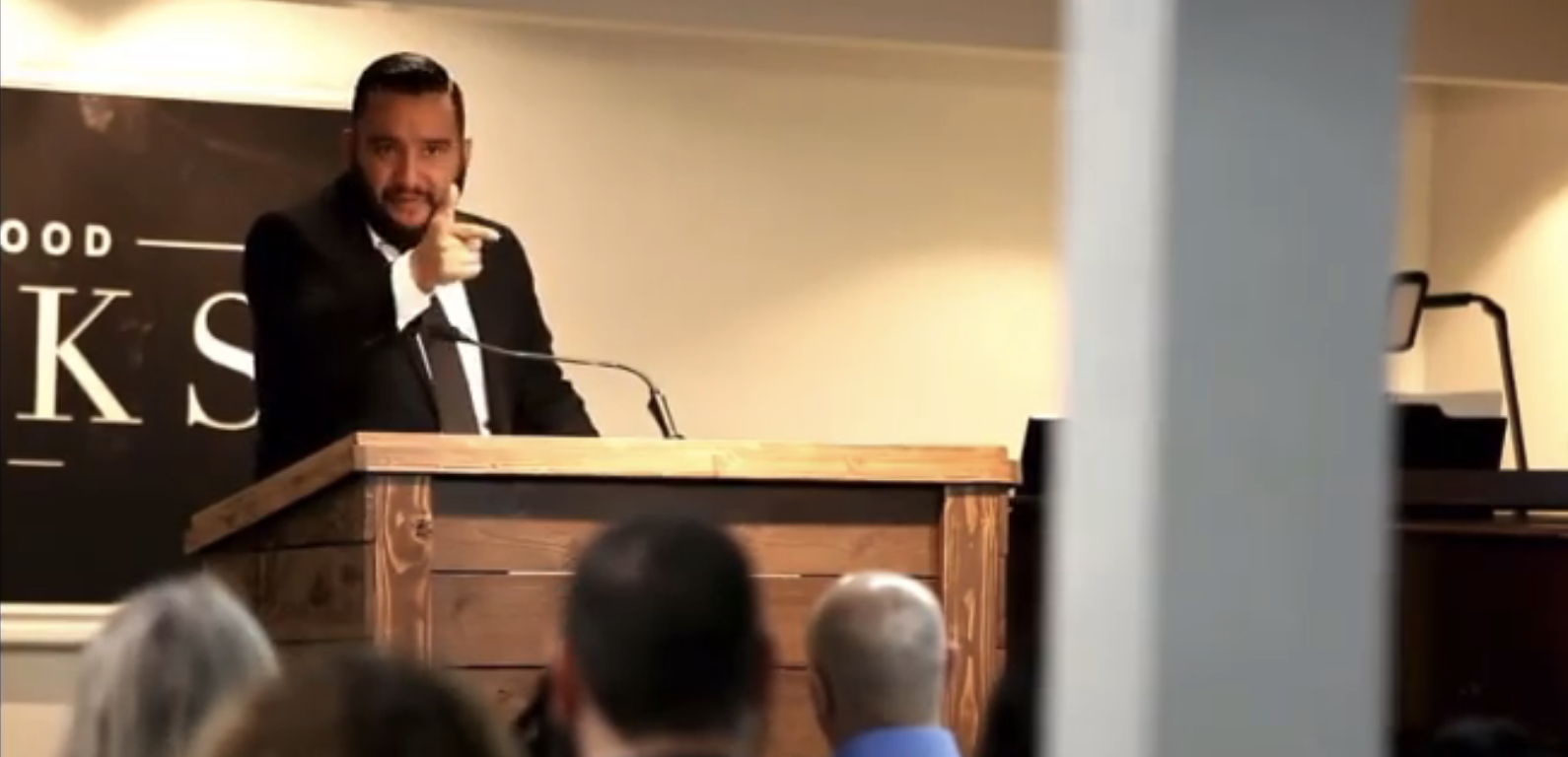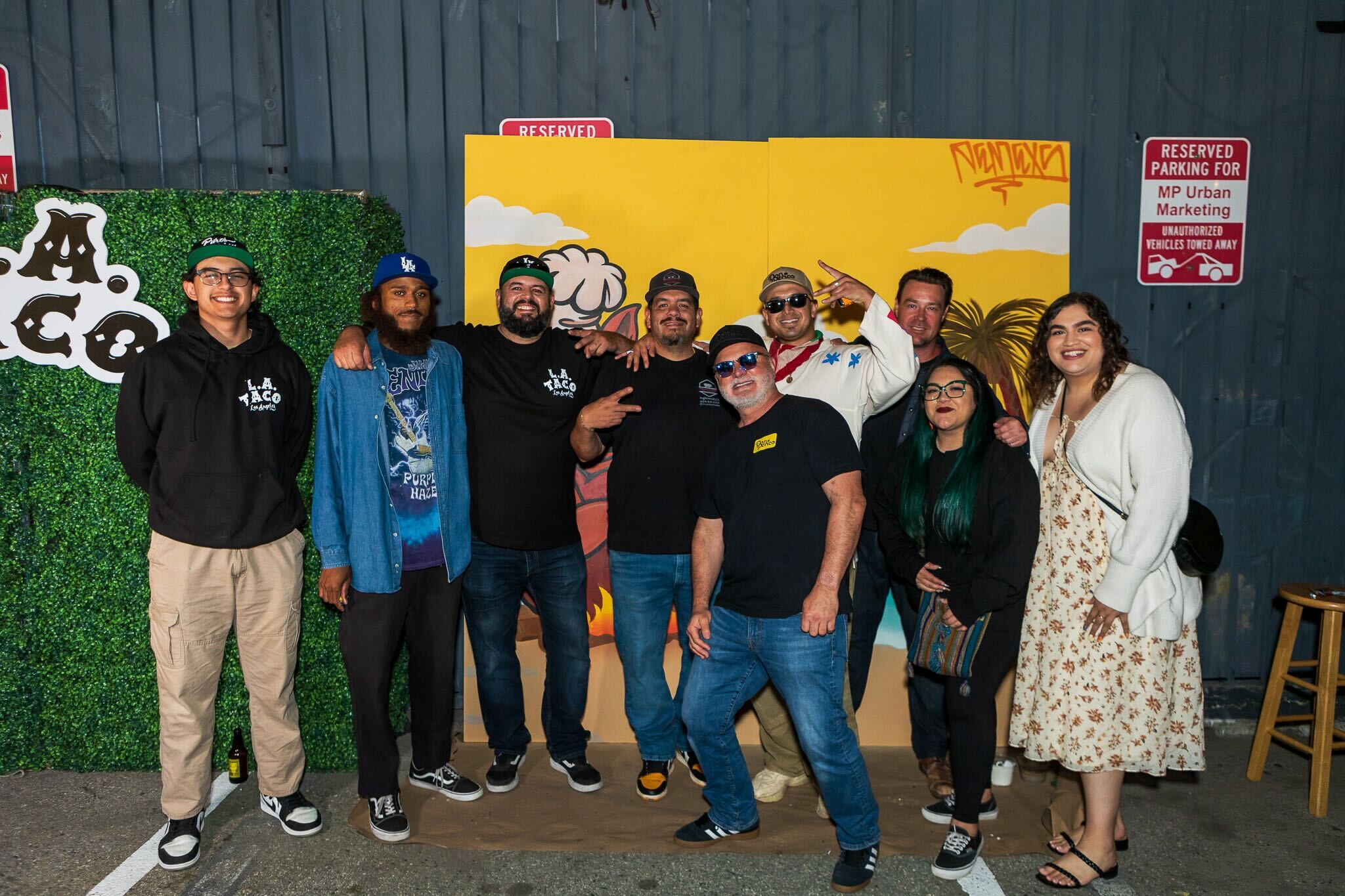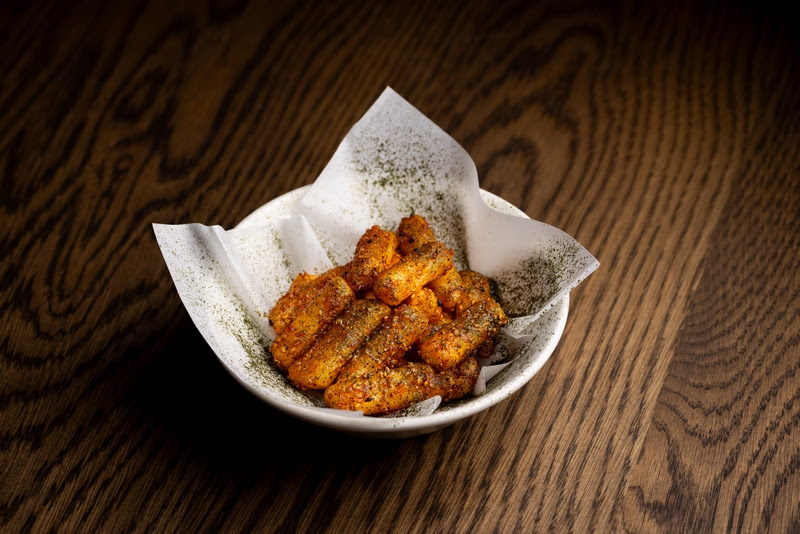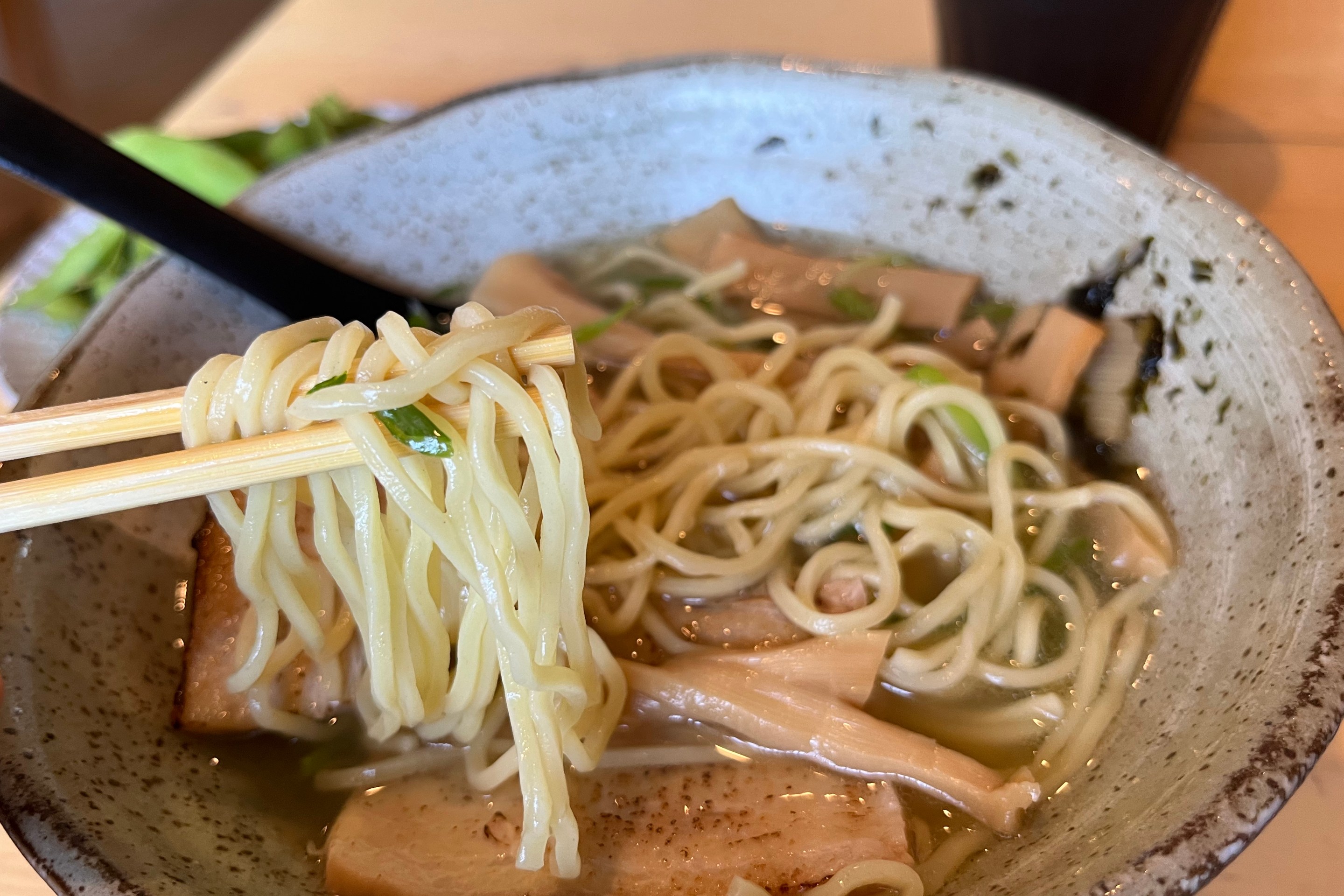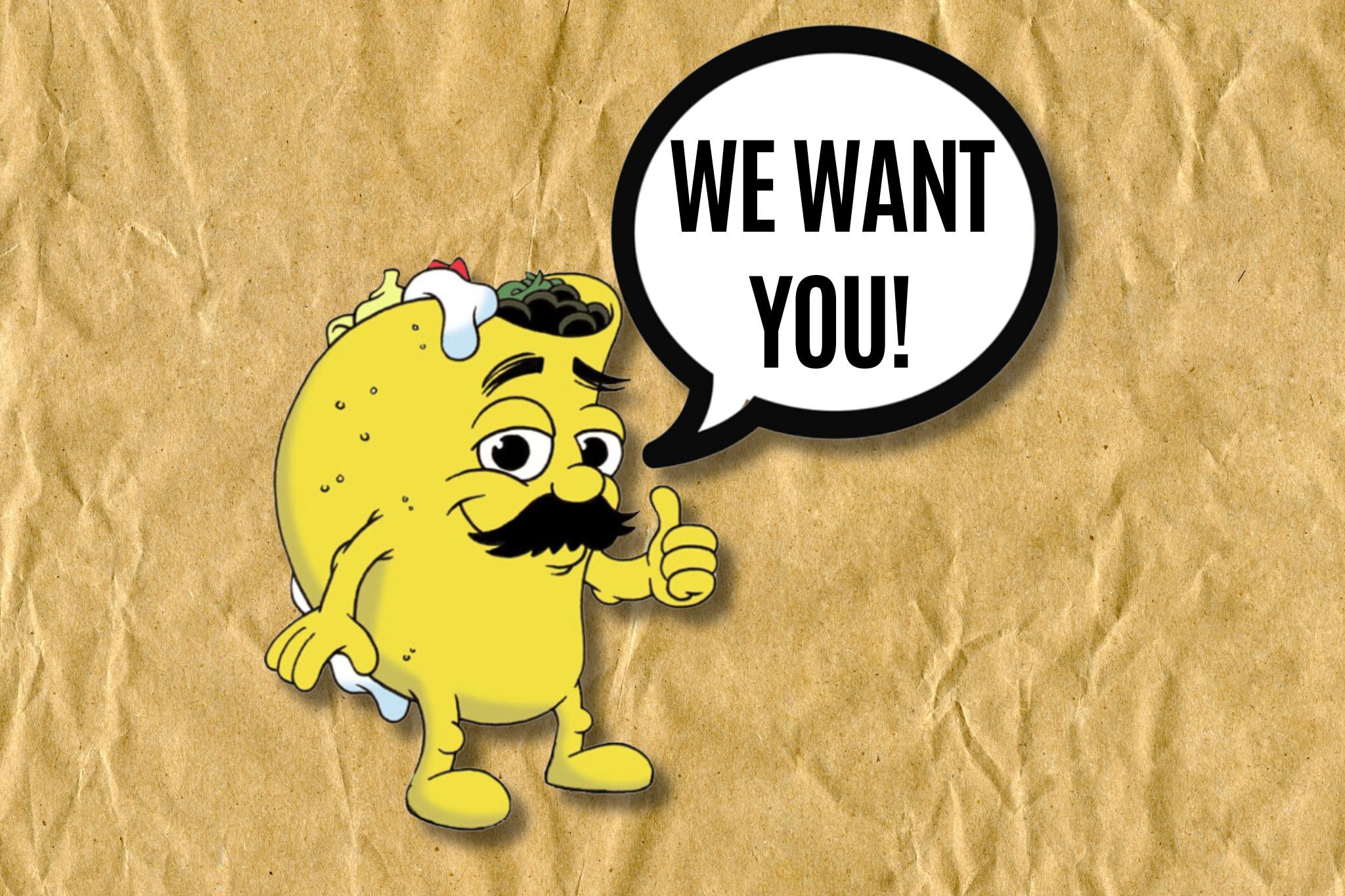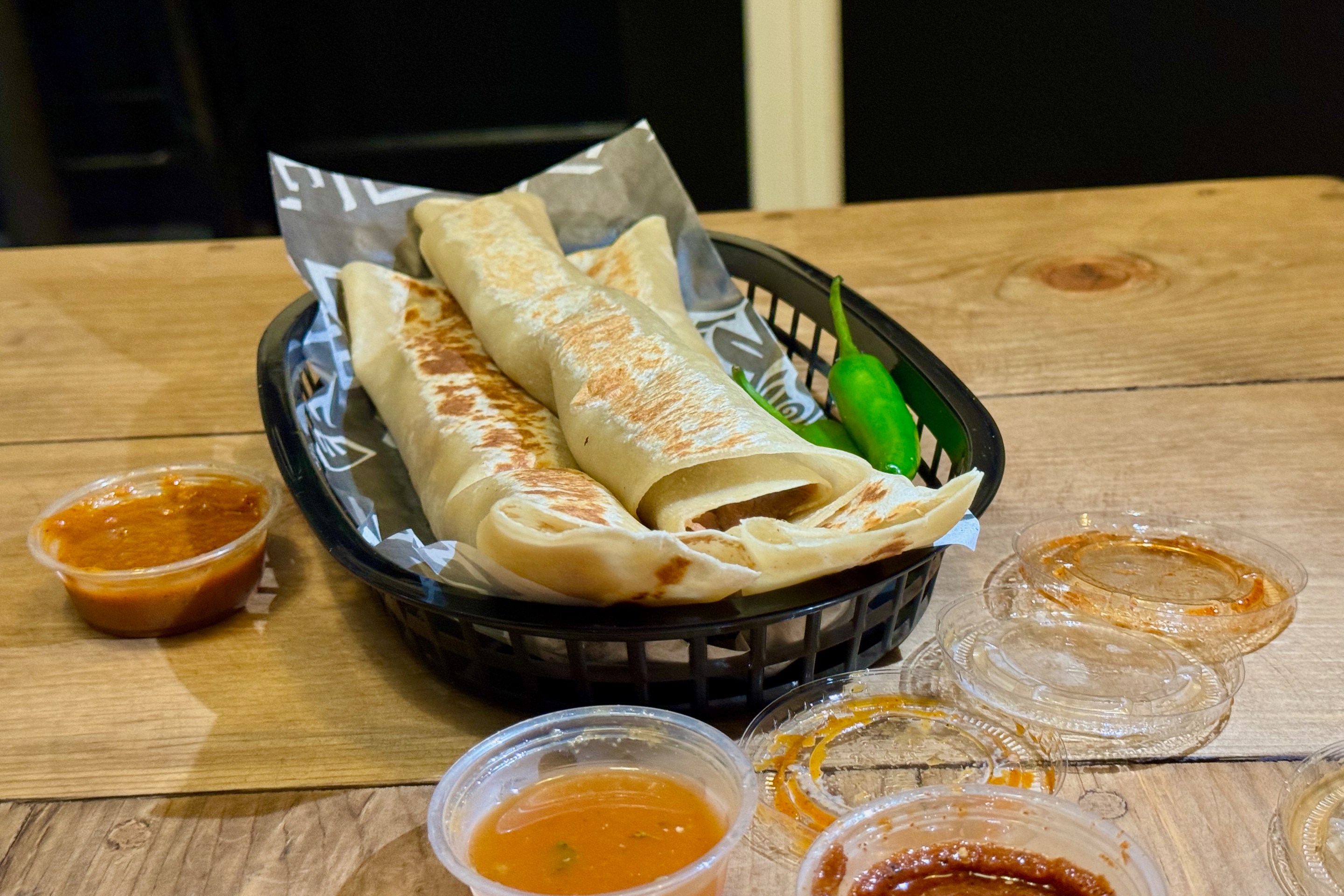elcome to friendly El Monte” is the slogan of the San Gabriel Valley city where a DIY bomb placed in First Works Baptist Church exploded early Saturday morning. The force of the blast shook the ground, turning the church windows into a bed of ground glass that shimmered along Tyler Avenue, the very place where members of Keep El Monte Friendly, a coalition of local activists and organizers who oppose the bigotry peddled by First Works’ pastor, Delfin Bruce Mejia, had planned to stage a Sunday protest. Stunned neighbors emerged to investigate as sirens wailed, smoke billowed, and storm clouds approached.
By sunrise, garlands of yellow tape restricted access to the 2600 block of Tyler Avenue. There would be no Sunday protest. Instead, there would be an investigation. Beneath a gray sky, FBI men patrolled the damp streets. Cops huddled under tarps, hiding from the drizzle. First Works Baptist Church, an anti-LGBTQ evangelical organization identified by Southern Poverty Law Center as a hate group, was finally being taken seriously.
To members of Keep El Monte Friendly, the bombing came as no surprise. It did, however, break hearts. A fellow organizer woke Amanda Mansoorbakht to share the news of the explosion and Mansoorbakht says that for the last month, Keep El Monte Friendly worked hard to warn city officials of the potential for danger: “We had hoped El Monte would take preventative measures to keep all of us safe.”
Mansoorbakht’s disappointment with city officials begs two questions.
For whom is El Monte safe?
To whom is it friendly?
Soon after Keep El Monte Friendly formed, First Works initiated a campaign of targeted harassment against them. Some of First Work’s critics received violent messages. One was assaulted on camera. Mansoorbakht reports being stalked at her home by Mejia’s followers. During a demonstration held in front of First Works, a church member ran toward a protestor, shoved her, and then ran back inside the church. To a gay critic, Mejia privately messaged, “Do the world a favor, faggot, and hang yourself.”
Mejia revels in hate speech and can be seen regularly making violent proclamations during his livestreamed sermons. Like the GOP, Mejia also fetishizes death. His personal Instagram account’s bio features a skull and crossbones emoji prefaced by the commandment, “Don’t Die.” Underneath that commandment is a YouTube link that takes viewers to a video where Mejia offers a lecture on hell. He prattles on for twelve minutes about the “second death” sinners might suffer in hell unless they accept the salvation offered by, who else, Mejia.
Mejia is especially notorious for his sexual anxiety, a quality that philosopher Jason Stanley has identified as a telltale sign of fascism. Mejia channels his fear into unrelenting homophobic and transphobic sermons and rants where he issues genocidal statements like, “Put these fags to death; we want the government to do it.” Characteristic of many Christian nationalists, Mejia also spreads conspiracy theories and preaches against science. Mejia uses social media to share anti-Semitic propaganda and is a staunch male and Christian supremacist, having declared that husbands should prohibit their wives from working outside the home and that female pastors “disgust” him.
Mejia appears pleased by Saturday’s explosion and has responded to the bombing with enthusiasm. He called the violence “exciting.” He also said, rather ominously, “We might as well go down in a blaze of glory!”
Some might say that Mejia sounds like an ungodly person but members of the growing ex-vangelical movement, a community largely comprised of the evangelical movement’s victims and their allies, disagree. They, too, have been sounding the alarm bell on religious extremism for years and scholar Chrissy Stroop, an ex-vangelical and transwoman, has written extensively about the violent and authoritarian threat posed by Christian nationalists. In 1995, Christian nationalism motivated Oklahoma City bomber Timothy McVeigh and his accomplice Terry Nichols, to commit a massacre that the FBI describes as “the worst act of homegrown terrorism in the nation’s history.” In retaliation for 1993’s Waco siege, which took the life of apocalyptic Christian cult leader David Koresh, McVeigh and Nichols claimed 168 lives.
In the 1920s, Wilhite served as the minister of the First Christian Church of El Monte. He also served as El Monte’s Kludd, the chaplain for the local Ku Klux Klan.
Stroop notes that when “white Christians make headlines for doing something illiberal…social media explodes with the accusation that they are ‘fake Christians.’” She argues against this impulse and rhetoric, asserting that people like Mejia and his flock are, indeed, real Christians. Practicing Christianity qualifies no one as inherently good. Religious extremism, however, often turns people into assholes. Hateful religious ideology consecrates malicious and violent behavior, and while many Americans will gladly point an index finger at religious extremists abroad, they ignore the remaining fingers pointing home.
These fingers also point to the past.
Mejia belongs to a tradition of bigoted Christian pastors who chose El Monte as a site of spiritual restoration and historian Dan Cady has written about two such figures, H.E. Wilhite and Robert Shuler. In the 1920s, Wilhite served as the minister of the First Christian Church of El Monte. He also served as El Monte’s Kludd, the chaplain for the local Ku Klux Klan. Cady notes that “no [Klan] ritual could be performed” in the absence of a Kludd, making a Wilhite vital to the day-to-day functioning of this local fascist organization. Preacher Edward Seawall Wilhite, another Klansman from nearby Downey, eventually replaced him. While the Klan is widely understood as a white supremacist organization, as a fascist fraternal society, they, too, upheld male supremacy. In a display of classic sexual anxiety, El Monte Klansmen were known to “[hide] in closets to catch adulterers and, in one incident, attempted to tar and feather a woman…”
Infamous for his “fire and brimstone preaching,” Reverend Robert “Fighting Bob” Shuler, served as minister of Trinity Methodist in downtown Los Angeles. Like Wilhite, Shuler also spent much of the 1920s working to strengthen the Klan. Schuler committed himself to the “doctrine of white supremacy” and he used mass media, magazines, and radio in particular, to promote his “tirades against Jews, Blacks, Catholics and alcohol…” Schuler’s fascism, and self-promotion, made him a popular figure. He ran for Congress in 1932 and received over half a million votes in the general election. Shuler never made it to the US Senate but since his campaign, other fascists have. Shuler accomplished much of this work from the comfort of his home in El Monte.
If El Monte’s elected officials want to get serious about fighting the fascism that is deeply rooted in their community, they need to dispense with pretenses of neutrality.
Mejia is more like these fascist preachers than not. Christian nationalism is marked by the fusion of militant Christian supremacy with white nationalism and though Mejia is undeniably brown, his appearance doesn’t foreclose the potential for fascist leadership.
On the contrary. A variation of white supremacy that some theorists term multi-racial white supremacy appears to be emerging and Mejia exemplifies the type of figure that this political movement places in leadership positions. By making an ambiguously racial person the face of fascism, which always rests on a foundation of white supremacy, bigots can deny that they are bigots. It worked for the Proud Boys, whose chairman was Enrique Tarrio, a Black Cuban American.
If El Monte’s elected officials want to get serious about fighting the fascism that is deeply rooted in their community, they need to dispense with pretenses of neutrality. Mejia and his followers have clearly communicated what side they are on. Responding to bigotry with silence, and inaction is the coward’s way of choosing a side.
